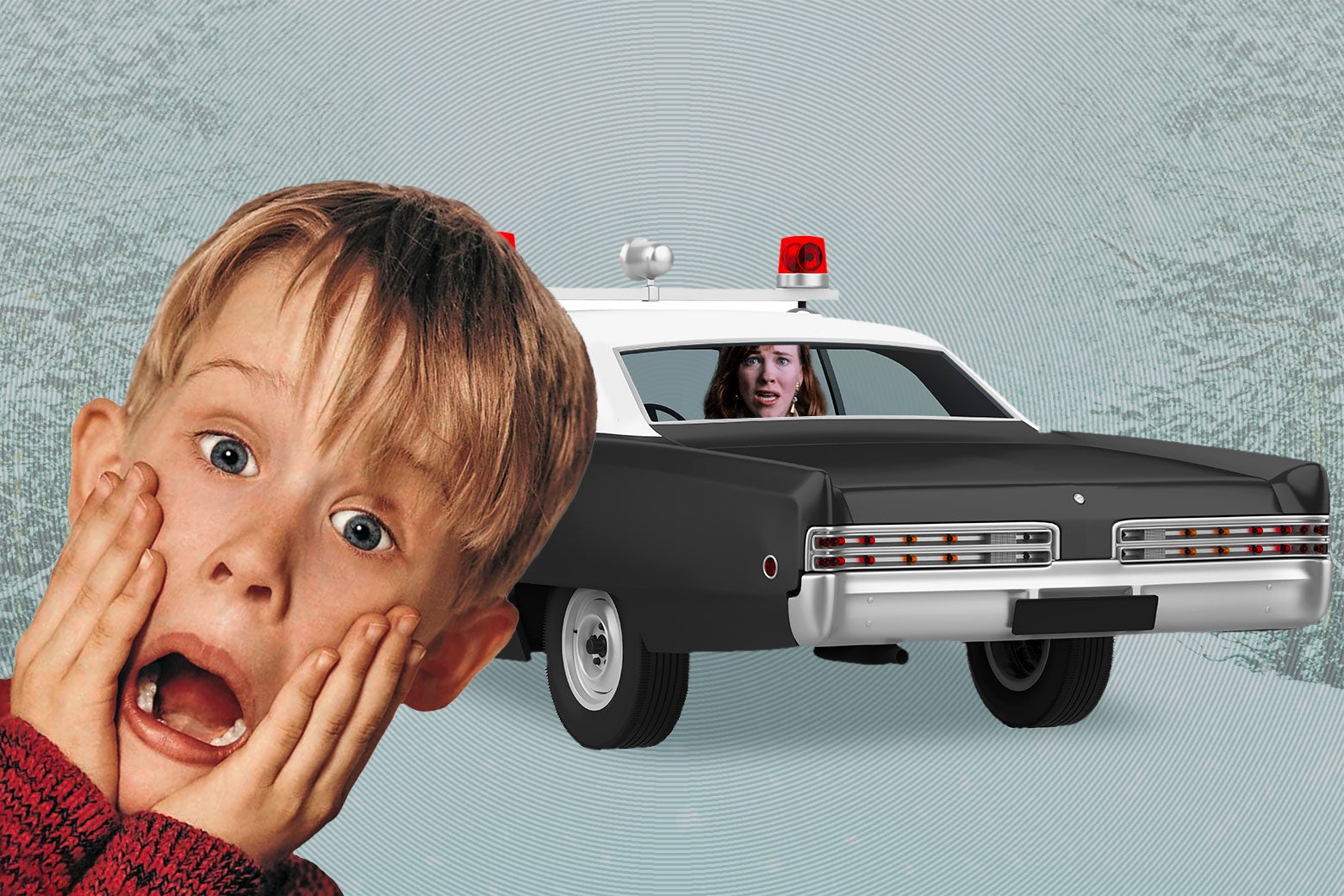Downtime
Much has been said about the criminal charges Home Alone’s Kevin McCallister would face in court. But what about the bigger offenders: his child-neglecting parents?

Photo illustration by Slate. Photos by 20th Century Studios and Getty Images Plus.
There has been a lot of speculation about the rap sheet of one Kevin McCallister—better known as the kid from the Christmas classic Home Alone. In the film, McCallister booby-traps a two-story mansion in the stately enclaves of Chicago with the intention of stymieing a home invasion, which, taken in a vacuum, falls into the relatively safe legal waters of self-defense. However, McCallister also seems to revel in his abuse of two of the dumbest criminals alive, to the point that it could be accurately categorized as elder abuse—not only does he light their heads on fire, he shatters their rib cages, lures them into a mildewed basement that has been converted into a torture chamber, and so on.
You can scroll through countless Reddit threads and SEO-friendly law firm blogs adjudicating the extent of Kevin’s crimes, as well as the depths of his disconcerting psychopathic imagination. But on my most recent rewatch of Home Alone—my fiancée and I savoring the yuletide maiming of Joe Pesci, as we do every year—I found myself considering a different, and far more pressing ambiguity. Seriously, what kind of punishment would Kevin’s parents be facing? They’re the real villains in this story! You can’t just leave your 8-year-old at home for days on end and get away with it, right? Right?
In Home Alone, much effort is taken to concoct the precise combination of chaotic elements that could cause people like Kate and Peter McCallister to inadvertently abandon their youngest son during the Christmas holiday. (There are botched head counts, disposed plane tickets, and a breezy, extremely pre-9/11 airport security system all working to their disadvantage like a perfect storm.) Midway through their trans-Atlantic flight to Paris—where the McCallisters have inexplicably decided to spend Christmas—Kate realizes they’ve made a horrible mistake. Kevin, it turns out, was forgotten. She immediately races back to Chicago by herself—Peter is a little, uh, checked out—arriving three days later, on Christmas morning, hours after Kevin brutalized and humiliated the two home invaders. The film ends before any serious police investigation into the various vectors of child endangerment that occurred, and you’re left believing that everyone in the McCallister family lived happily ever after. (Or, at least until the sequel.)
There’s just one problem. Illinois—where Home Alone is set—is one of the few states in the union that has a statute on the books outlining the exact parameters for what age a minor can be legally left under their own supervision without the parents facing charges for child neglect. The age is 14, which seems high! (Again, in the movie, Kevin is portrayed as a uniquely precocious 8-year-old.) So, by the letter of the law, Kate and Peter would be in hot water, because seriously, how do you board an airplane without being totally sure that your whole family is with you? Who does that?
However, Jonah Perlin, an associate professor of law at Georgetown University who graciously agreed to answer my questions, argues that the law is a bit more nuanced than it might seem. In particular, he points to a clause written in that Illinois statute stating that, in order for an incident of child abandonment to be considered a crime, the minor must be left alone for “an unreasonable period of time without regard for [their] mental or physical health, safety, or welfare.” Does an 8-year-old stranded in the comfort of his own home, regardless of the presence of a low-IQ Joe Pesci, represent an abdication of their safety? That’s the stuff that defense attorneys are paid to argue about, baby!
“Many states don’t have a hard-and-fast law for this stuff,” explained Perlin. “They don’t have a specific age cutoff, they just go by the circumstances. But the statute does grant leeway with the administrative language about the greater risk of harm.”
With that in mind, it seems like Peter and Kate might actually be in good shape. They didn’t leave Kevin locked in a hot car, or adrift at a Walmart, and their dereliction was the result of a genuine misadventure, rather than something sadder or weirder. At most, said Chuck Rohde, a lawyer in Illinois and a member of the Department of Children and Family Services, they’d be facing a misdemeanor offense and a stint of community service—no prison time whatsoever. “Most of these cases happen after Mom or Dad has to go to work and there are extenuating circumstances. There is even a first-offense probation for this statute, which is a slap on the wrist and parenting classes. They aren’t going to go to jail,” said Rohde.
Another factor working in the McCallister parents’ favor is they—and all five of their children—are witnesses to an active breaking-and-entering crime scene. (Yes, most of the action in Home Alone occurs after Kevin is deserted, but eagle-eyed experts of the film will remember that Joe Pesci cases their house in the opening scenes, dressed as a fake police officer, right in front of Kevin’s parents.) This makes Kate and Peter valuable assets to the prosecution of the two burglars. You know what would disrupt those proceedings? A child endangerment hearing.
“The prosecutors want them to be cooperative,” said Rohde. “They wouldn’t want to drop the hammer on one of their key witnesses.”
So there you have it. Despite leaving their youngest child alone at home for three straight days, Kevin’s parents are going to walk free, hopefully with a renewed sense of the meaning of Christmas. As for Home Alone 2? Well, the less said about that, the better.
Children
Jurisprudence
Law
Movies
Parenting
>>> Read full article>>>
Copyright for syndicated content belongs to the linked Source : Slate News – https://slate.com/human-interest/2023/12/home-alone-movie-kevin-2023-christmas-legal-consequences.html?via=rss










